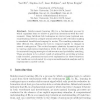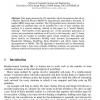286 search results - page 20 / 58 » Using inaccurate models in reinforcement learning |
ECAL
2001
Springer
14 years 6 days ago
2001
Springer
Reinforcement learning (RL) is a fundamental process by which organisms learn to achieve a goal from interactions with the environment. Using Artificial Life techniques we derive ...
ECAI
2010
Springer
13 years 8 months ago
2010
Springer
Abstract. Infinite-horizon multi-agent control processes with nondeterminism and partial state knowledge have particularly interesting properties with respect to adaptive control, ...
NECO
2010
13 years 6 months ago
2010
Reinforcement learning models generally assume that a stimulus is presented that allows a learner to unambiguously identify the state of nature, and the reward received is drawn f...
ACL
2009
13 years 5 months ago
2009
In this paper, we present a reinforcement learning approach for mapping natural language instructions to sequences of executable actions. We assume access to a reward function tha...
PRICAI
2000
Springer
13 years 11 months ago
2000
Springer
This paper presents the CQ algorithm which decomposes and solves a Markov Decision Process (MDP) by automatically generating a hierarchy of smaller MDPs using state variables. The ...


